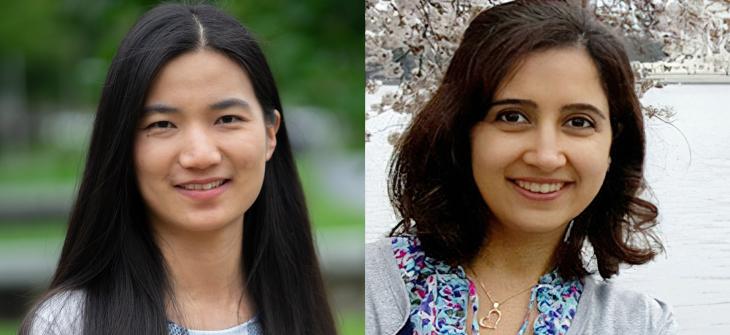Guan, Rahimi Receive NSF CAREER Awards
Content

Manning College of Information and Computer Sciences Assistant Professors Hui Guan and Negin Rahimi have each received National Science Foundation (NSF) CAREER awards in the 2023–2024 academic year, for their work on deploying deep neural networks into resource limited devices, and diverse and unbiased information access systems, respectively.
The CAREER Program offers the NSF’s most prestigious awards in support of early-career faculty, aiming to boost those who can serve as academic role models in research and education and lead advances in their department or organization’s mission.
Guan, whose research focuses on the intersection of machine learning and computer systems—and on improving the speed, scalability, and reliability of machine learning—will focus her CAREER project on deploying deep neural networks into resource limited devices and edge environments.
As Guan explains, there is currently a fundamental constraint preventing the implementation of deep neural network models on resource-constrained devices, such as wearable medical sensors, robots, or self-driving cars. “Because these models are currently designed to always be able to meet peak demand, it requires too much computing power, and you physically cannot do it,” she says.
For example, let’s say you have a camera designed for observing and identifying songbirds in your backyard. Perhaps the neural network installed on the camera would have trouble recognizing every single songbird that lives in your area, given its hardware constraints.
The solution is adaptiveness. “Let’s say some birds are more active in the morning, and some are more active in the afternoon,” says Guan. “We could design one model for the morning and one model for the afternoon. Both of them, because they are simpler, will require less computing resources and could more easily run off the device.”
In this way, Guan’s research is exploring how to help these resource-constrained systems adapt to natural variations in demand, to help “squeeze” the most powerful model possible into the hardware available. Adapting to variations in the demand placed on computing devices helps machine learning models to both lower the amount of computing resources that are required to support them, and ensure that the computing resources that are available are fully utilized.
In other situations, multi-tenancy—or the co-existence of multiple machine learning models on one device—is the issue. In the case of the robot guide dogs being developed for the blind at the DARoS lab, Guan is helping CICS Associate Professor Donghyun Kim and colleagues ensure that a device with limited computing resources can juggle several crucially important tasks without failure. “A robot guide dog needs to be able to detect and classify objects like traffic lights, but you may also want it to be able to recognize faces,” Guan explains. “This requires two different models, but because they both use visual input, you may be able to share parameters and results between the models, allowing each task to run faster with fewer computing resources.”
Rahimi—whose research aims to build general-purpose and unbiased intelligent systems for information access through learning, user interaction, and enhanced interpretability—will focus her CAREER project on enabling diverse and unbiased information access systems with the goal of making information seeking easier, more effective, and trustworthy.
“Large generative artificial intelligence models, such as ChatGPT, are subject to hallucinations, misleading answers, misinformation, and hidden biases,” explains Rahimi. “But because of their coherence and contextual relevance, they tend to sound more authoritative and definitive than they should.”
Another issue is ambiguous user queries, she explains, noting that current systems, including those that use large language models (LLMs), do not appropriately model ambiguity to provide users with alternative answers to their questions.
To address these issues, Rahimi aims to enable users to obtain an interpretable, diverse, and unbiased set of alternative answers, viewpoints, subtopics, or perspectives in response to their queries, where each distinct answer or viewpoint can be faithfully attributed to a set of evidence and supporting information sources.
According to Rahimi, improving generative AI models through access to explicit knowledge resources will require developing new retrieval models. Once this access is established, it can be improved through algorithms that generate explanations of what led to previous failures.
“With techniques like these, we can improve the accuracy, diversity, and trustworthiness of information from LLM-based information access systems,” she says. “With more diverse results, these systems promote a more comprehensive understanding of topics, encourage critical thinking, and facilitate informed decision making.”
Hui Guan has been an assistant professor at CICS since 2020. In addition to the NSF CAREER award, she received an Amazon Research Award in 2022, an IBM PhD Fellowship from 2015–2018, and an outstanding dissertation award from North Carolina State University in 2020.
Negin Rahimi joined the Center for Intelligent Information Retrieval (CIIR) at CICS in 2019 as a senior postdoctoral research associate and was promoted to research assistant professor in 2021 and to tenure-track assistant professor in 2024. She received a Google Research Scholar award in 2022 and an Amazon Research Award in 2019 with James Allan, professor and director of the CIIR.